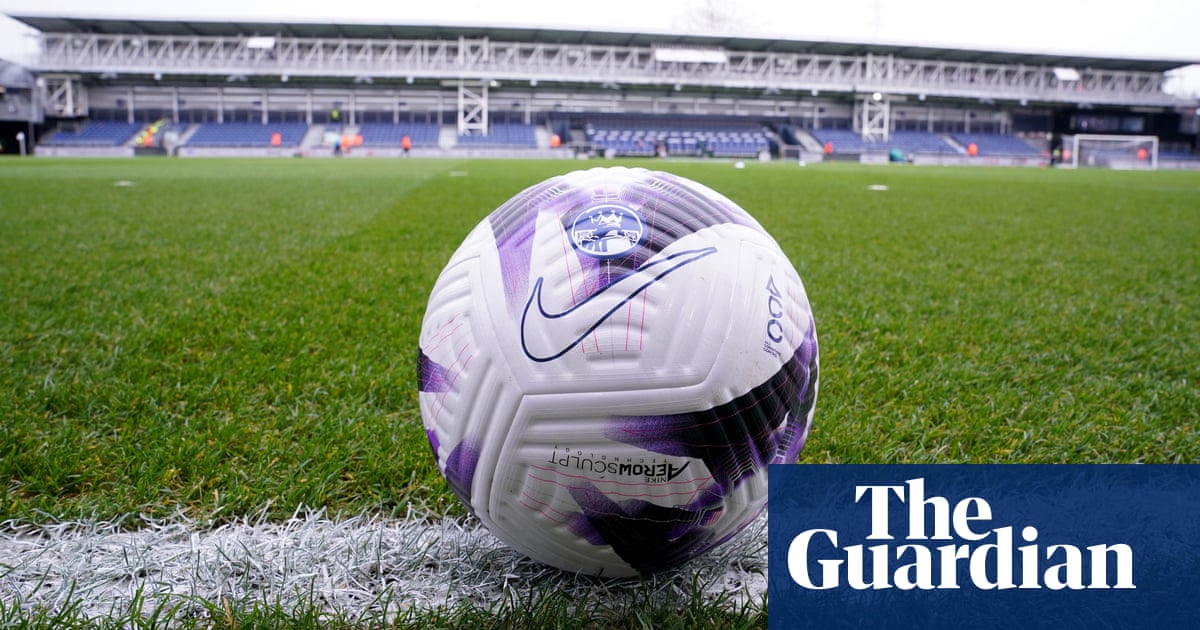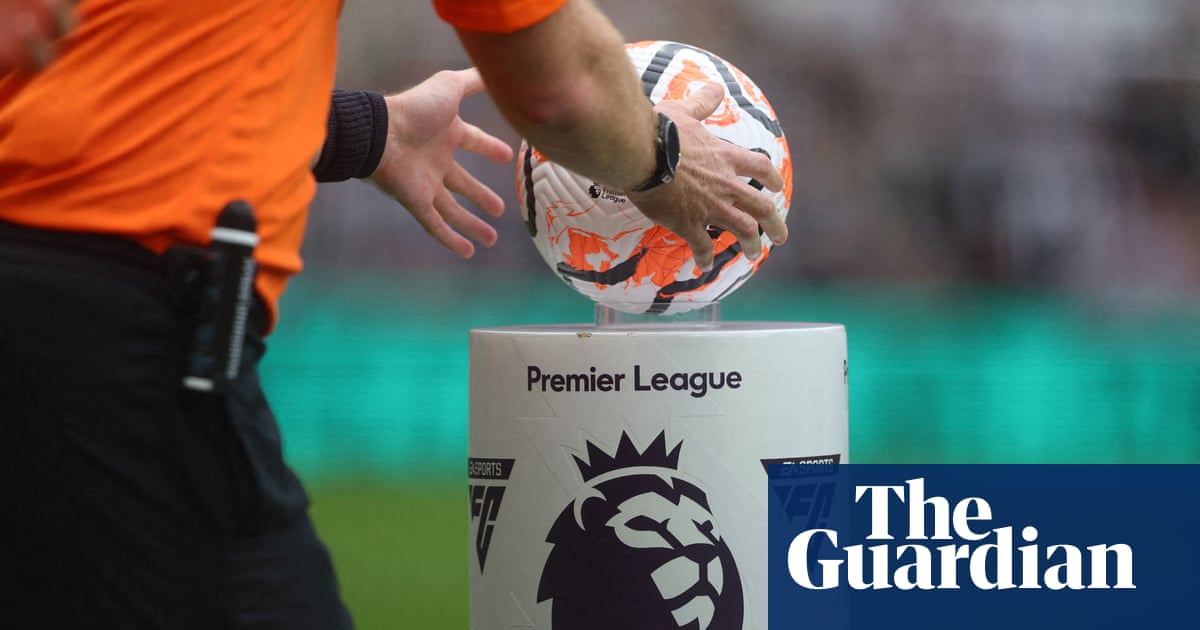
Making 11 changes and yet still knocking Arsenal out of the League Cup came at a price for Liverpool: they are out of the EFL Trophy. No, you won’t hear the wailing of despair down Anfield Road. But, by playing half a dozen youngsters alongside his fringe first-team players on Wednesday night, Jürgen Klopp ensured that an even younger side went to Accrington the night before – and got hammered 5-2. Liverpool teams rarely concede five. Yet, such are the good times rolling at Anfield, even when two do so in consecutive nights, there is next to no consequence.
With most top sides resting up to a dozen first-team players for the League Cup ties and another whole cohort out on loan, this week highlighted the sheer depth of the squads at the biggest clubs in the Premier League. On Tuesday night, Manchester City hosted Southampton in the League Cup and sent a team to Bolton in the EFL Trophy. They did the same in the previous round, fielding two teams on the same night. Likewise high-flying Leicester City, who were in cup action at both Grimsby and Burton. On Wednesday, Chelsea and Manchester United met at Stamford Bridge, 24 hours after younger teams representing the clubs were at Plymouth and Doncaster respectively.
The Under-21 team that Liverpool put out against Accrington on Tuesday was so young that two 17-year-old combined for their second goal, with Thomas Hill (who wears No 99 on his shirt) setting up No 97 Leyton Steward.
Premier League clubs have between 40 and 70 professional players – and dozens of full-time staff – so have the resources to field four or five teams on the same night if they really had to. They don’t – and therefore many players actually get to play far fewer games than previous generations. But, as they are extremely well paid and have the self-belief that will make it to the top, they stay at a Premier League club rather than seeking more opportunities to play lower down the leagues.
Category 2 academies (who compete in the Professional Development League, which sits below Premier League 2 and generally comprises Championship clubs) tend to offer players the most gametime. In late August, the Millwall first team, Under-23s, Under-18s and Under-16s all had games on the same weekend. The first team were back in action on the Tuesday night, which meant Under-23s boss Kevin Nugent was not able to pick any senior players. He just about cobbled together a team – although his oldest players were just 20. At that level, everyone gets a game.
And yet two of the Championship’s smallest clubs, Luton and Preston, do not have a second team at all. Being Category 3 academies, they are not in the Professional Development League and both withdrew from the Central League (the third tier for Under-23s teams) citing the usual factors: that they played too few games and the fixtures they did play were at inconvenient times, often on training grounds, against wildly varying opponents.
Mismatches are common at this level; clubs often arrive at games with a mini-bus full of 17-year-olds only to discover that their hosts are fielding half a dozen senior pros who are short of match fitness. The financial demand is also off-putting.
So the only competitive action either club’s fringe players have had in the last month were county cup matches against non-league opponents. That leaves players who are too old for the youth team depending on loan moves and training with the first team to prove they are ready to make the leap into the Football League.
When clubs are relegated down the divisions, it takes a real show of defiance and long-term commitment for them to keep investing in their academy. If their Under-23 players cannot get into their first team at a lower division, they will struggle against Premier League youngsters. Of the 24 clubs in the Premier League 2, Sunderland are bottom of the table, winless after nine games.
Running a second string is a major financial and operational commitment for clubs in League One and League Two. Seventeen of the 23 clubs in League One manage it but, when a club is in turmoil, just putting out a second team can be an achievement in itself. Earlier this month, Bolton, punch-drunk by administration, sent an Under-23 side to face fellow League One club Ipswich. The hosts had lost their first six games of the season, yet still beat Bolton 6-3. Investing in an Under-23s team is expensive but, without that step on the pathway to the top, fewer young talents would make it to the big time.
Next man up
Being taller and blonder than almost everyone else on the pitch helps Sam Dalby stick out, but anyone who watches the Watford striker for long will notice his other more valuable attributes. When Dalby made his debut for Leyton Orient in League Two at the age of 16, other clubs took notice. Leeds paid a six-figure fee for him and, 18 months later, so did Watford.
A target man with a deft touch, Dalby’s potential outshines his immediately obvious impact. The 19-year-old makes up for his lack of pace and agility with a confident left foot, a nice touch with his back to goal, and clever vision that helps him feed midfield runners. His intelligence is not limited to the field. A quiet thoughtful young man, he is one of the few footballers with a grade A in Russian GCSE.
Fantasy football
Surely the most surreal fixture this week was the Scottish Challenge Cup quarter-final, which finished: Solihull Moors 3-3 Rangers Colts. Yes, Solihull, “posh Birmingham”, in a Scottish cup, against the giants of Ibrox, or rather their second team?! In a bid to liven up the Scottish equivalent of the EFL Trophy, top National League sides, Scottish Under-21 teams and Irish clubs have all been invited into the competition in recent years. All very strange.
Remember me
Coming on as sub for Solihull was former Rangers loanee Gaël Bigirimana, who had only signed for the club a few hours earlier. A child refugee from Burundi, Bigirimana was a teenage star at Coventry before joining Newcastle in 2012. He returned to Coventry after making just 13 league appearances in five years on Tyneside. Bigirimana, who has since had two years at Motherwell and played one game for Hibs, missed the final penalty as Rangers won a shootout 4-3.
This week in … 2012
Nathan Jones has been sacked as Stoke City manager but seven years ago his reputation was growing. In October 2012 his Charlton Under-21s, the PDL champions, faced Brighton – his next employer – at The Valley. Charlton included a group of first-year pros who became established Championship players elsewhere: Morgan Fox (at Sheffield Wednesday), Callum Harriott (at Reading) and Jordan Cousins (at Stoke).
Future MLS star Bradley Wright-Phillips had little joy up front, but local lad Nick Pope kept a clean sheet in a goalless draw. For Brighton, Spanish veteran Iñigo Calderón helped young Lewis Dunk through the game in which the star man was teenager Solomon March. Pope and Dunk have since played for England; March may well do so, too. The Guardian Sport












